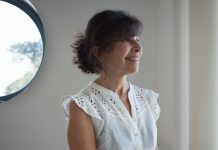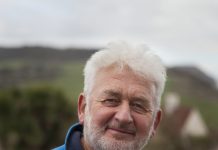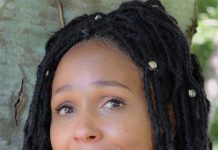‘I was born in Bridport in 1970. My Mum had Asian flu early in her pregnancy, which was diagnosed as the reason I was born deaf, and that was confirmed when I was 6 months old. From then on for the next two years a peripatetic teacher for the deaf would visit me and my Mum once a week. Growing up in Chideock, as a young child I had two or three good friends, but integrating with other hearing children was difficult. When I was 2 years of age I was in a specialist unit within a primary school in Puddletown, where there was a teacher called Mrs Glendenning. Her husband was an audiologist, who believed strongly that sign language was not the best way forward with deaf children. His theory was that learning to speak was best, so as a result, that was the focus as I grew up. Sign language wasn’t allowed at all.
My Mum was working at the school for two years supporting me with my speech and reading. When I was about 5 or 6 I moved to a new school in Dorchester, a specialist unit at Middle School. The approach was the same, focussing on speaking, reading, and writing. Twice a week I had specialist speech therapy, with headphones on, concentrating on speaking. That was really hard, I’ll never forget it. For example, to learn about the sound “f” I had to blow softly on a feather on a bit of card, seeing the movement and controlling the breath; I was copying the therapist, linking a visual clue with the sound. To be quite honest it was really frustrating, practicing the same skills week after week until I finally got it, and not moving on until I had.
When I was 11 I went to a specialist school for the deaf in Exeter which I really liked. There I was much more involved with a deaf community, but the school had 2 departments, one using sign language and the other where the focus was on speech and language. That was the unit I was in, so again I was growing up not allowed to use sign language; in fact I would get told off if I tried to, and we used to help each other by signing from behind the lids of our desks when the teachers weren’t looking. This way of teaching deaf children went right back to Alexander Graham Bell, the inventor of the telephone, whose wife and mother were both deaf. As a result he pioneered ways of teaching speech and elocution, strongly believing deaf children could learn to speak, and his oral approach carried on right up to when I was growing up.
I was happy in Exeter, and using the library I was reading a lot. This helped me to understand the teachers better, and I achieved 9 CSE’s. I also swam for the school, taking part in competitions. After I left Exeter, I went to a specialist school in Doncaster, where I learned business studies and completed a B-Tech diploma. I enjoyed living in Doncaster—there was a larger deaf community there than Exeter. Then I went to work in Spain, where I taught signing to very young hearing children, using visual techniques as a way of helping them to learn English. I made lots of deaf friends in Spain, but obviously Spanish sign language is very different to British sign language, just as the spoken languages are different.
When I came back from Spain I began teaching sign language to evening classes in Dorchester and Bridport. I realised how much I enjoyed teaching, and recognising my potential, DCC gave me a grant to go to university in Wolverhampton to do teacher training. After four years I got my degree, in deaf studies with education, and in fact I stayed living in Wolverhampton another ten years. During that time I had a year off and went travelling in the Far East, and met loads of interesting people. Meeting those people made me realise that they didn’t see me as a deaf person; they saw me for who I was. That whole experience gave me huge confidence. After my degree course the university gave me a teaching job and I lived in a flat in Wolverhampton with some deaf friends; we thought we were enjoying the loud music coming from next door, dancing along to the beat, when a hearing friend came round and pointed out it was the builders and their drills the other side of the wall, renovating the property, that were entertaining us.
I’m happy with the way I am as a deaf person. I enjoy many artistic and craft-based activities, most recently crafting mirrors and frames out of unusual shells I’ve used in the kitchen and found along the coast. I love being outdoors, swimming, skiing and gardening. I also enjoy going out with my three children on family days out. I try to encourage all of them to be active and have a can-do attitude with everything. The oldest is 12, the next one is 10, and the youngest is 5. When my oldest boy, Finn, was born I was signing with him from the very first days. When he was 7 months old his first sign was milk. The more I responded to him, the more his vocabulary developed. My daughter Callie’s first sign was bath, and the youngest, Jasper’s, first sign was sleep, because that was all he seemed to want to do, although that’s certainly not the case now! Bringing up a young family obviously presented some challenges; often I wasn’t sure if they’d understood something, or if in fact I’d understood. Everyday life was a bit different to others, but funny situations could arise; the children once found it hilarious when I was hoovering the whole house, not realising that the kids had actually switched it off. They all go to school in Charmouth, and are involved in the community. We go to the Bridport Deaf Club once a month, a close-knit group sharing information with other deaf people. The friendships created are massively important because of the person I am; belonging brings the benefit of a consistent community which supports each other, as well as linking us to other Deaf Clubs and events around the UK.
I’ve found all my life that people have sometimes been scared of me once they’ve known I’m deaf. This has been at times humorous for me; however it’s been most people’s perception that deafness is a disorder or disability. The exact term is called ‘Surdophobia’ which is a fear of the deaf. Maybe this comes down to not coming into contact with many deaf people, not knowing how to communicate or simply not even knowing what deafness is. My wish is that everyone could sign, or at least have a willingness to learn. Steps towards that would be people using more of a visual language and expressing more through body language. Fundamentally being deaf is not a disease, it is just not being able to hear. I have a ‘Life is too short’ outlook, which has come from my family, friends and experiences, the good and the bad. When talking to my friends they say I come across as a real people person, not someone just going through the motions, but really getting the best out of situations.
These days I have a company called Lyme Bay BSL which is related to training and sign language; I run deaf awareness training courses which can be one day or up to six weeks long depending on the client’s needs. I set up the company when I moved back to Dorset eight years ago, and two years ago I was nominated for an award by Signature, the sign language examination board, as one of four contenders in the Centre of the Year category in the 2014 awards. I don’t just like my job, I love my job and the people I get to meet, and it’s a job which has created life-long friendships.’









